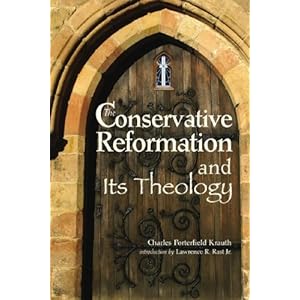My favorite American Lutheran theologian is Charles Porterfield Krauth (1823-1883). He lived and worked in challenging circumstances as he sought to lead his synod (Pennsylvania) and church body (the General Council) to a doctrine and practice consistent with the Lutheran Confessions and the church catholic. Many of the congregations and pastors that he sought to influence had little or no familiarity with confessional Lutheran theology and practice. They had been catechized in a form of Lutheranism that intentionally sought to accommodate American culture. He succeeded in some ways, and, perhaps, not in others. That notwithstanding, his The Conservative Reformation and Its Theology (recently reprinted by Concordia Publishing House with an intro by yours truly) remains the most influential book on the nature and character of Lutheranism that I have ever read (with thanks to Robert Preus, who directed me to it). And my favorite part of my favorite work is this:
"The spirit of the Reformation was no destroying angel, who sat and scowled with a malignant joy over the desolation which spread around. It was overshadowed by the wings of that Spirit who brooded indeed on the waste of waters and the wilderness of chaos, but only that he might unfold the germs of life that lay hidden there, and bring forth light and order from the darkness of the yet formless void of creation. It is vastly more important, then, to know what the Reformation retained than what it overthrew; for the overthrow of error, though often an indispensable prerequisite to the establishment of truth, is not truth itself; it may clear the foundation, simply to substitute one error for another, perhaps a greater for a less. Profoundly important, indeed, is the history of that which the Reformation accomplished against the errors of Romanism, yet it is as nothing to the history of that which it accomplished for itself. The overthrow of Romanism was not its primary object; in a certain sense it was not its object at all. Its object was to establish truth, no matter what might rise or fall in the effort.... The mightiest weapon which the Reformation employed against Rome was, not Rome's errors, but Rome's truths."
Charles Porterfield Krauth, The Conservative Reformation and Its Theology, intro Lawrence R. Rast, Jr. (Saint Louis: Concordia Publishing House, 2007), 202-203.
http://www.cph.org/p-661-the-conservative-reformation-and-its-theology.aspx



2 comments:
Great quote. Thank you for posting it. I have wanted to read all of Krauth's Conservative Reformation for a long. I am again encouraged to do so with the post here. Thanks!
Yes thanks for the post. Thank God that some Lutheran greats wrote in English!
Post a Comment